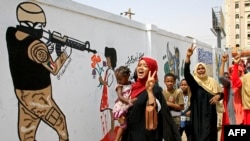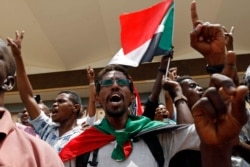Sudan's Transitional Military Council and opposition coalition finalized a power-sharing agreement Sunday that aims to stabilize the country for the first time since the military ousted Omar al-Bashir in April after months of mass demonstrations.
The final agreement came after weeks of tense talks and repeated attacks on pro-democracy protesters by TMC security forces.
Thousands of protesters flooded the streets of Khartoum on Sunday to celebrate the signing of the deal.
Israa Mohamed applauded the agreement, saying it will be a base for a civilian country. However, he added, the only thing that guarantees the agreement's success is to keep an eye on the revolution demands.
Protester Abdallah Ali has been demanding political change since December. He said the agreement is a step forward, but not the end of the journey.
"Signing the constitutional draft was an important step to resolve the political turmoil, but it was not our ultimate goal," he said.
The military and opposition agreed the transitional decision-making body, known as the sovereign council, will contain an equal number of military figures and civilians. The head will be a civilian with a military background.
The sovereign council will be established Aug. 20, with the TMC being dissolved on the same day.
Analyst Mohamed Abdurrahman believes the agreement is a crucial step to resolve Sudan's political crisis, but is concerned about the division between forces in the transitional period.
In addition, he's worried the peace process might be hurt by armed movements resisting the agreements, including rebel groups in Sudan's Darfur, Blue Nile and Nuba Mountain regions, which battled for years against the Bashir regime.
There is also uncertainty regarding the pro-Bashir group called the Revolutionary Front and its reaction to a new, unelected government in Khartoum.





